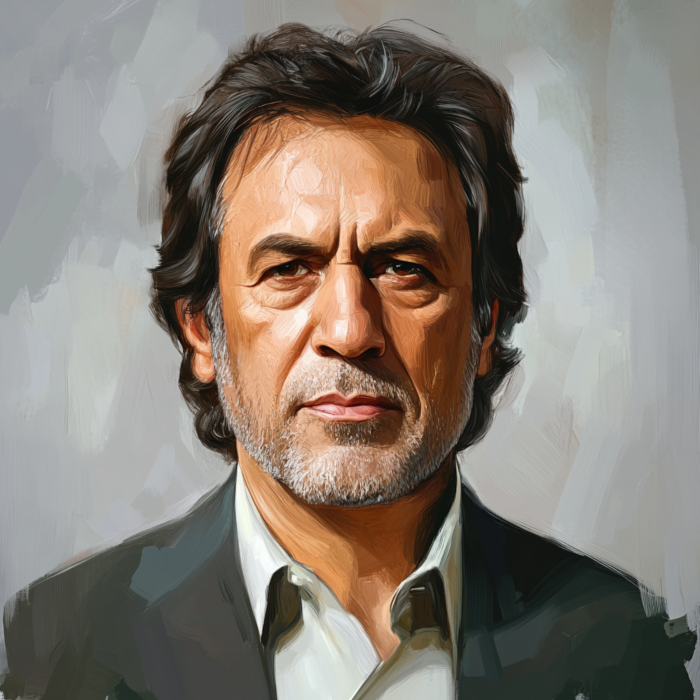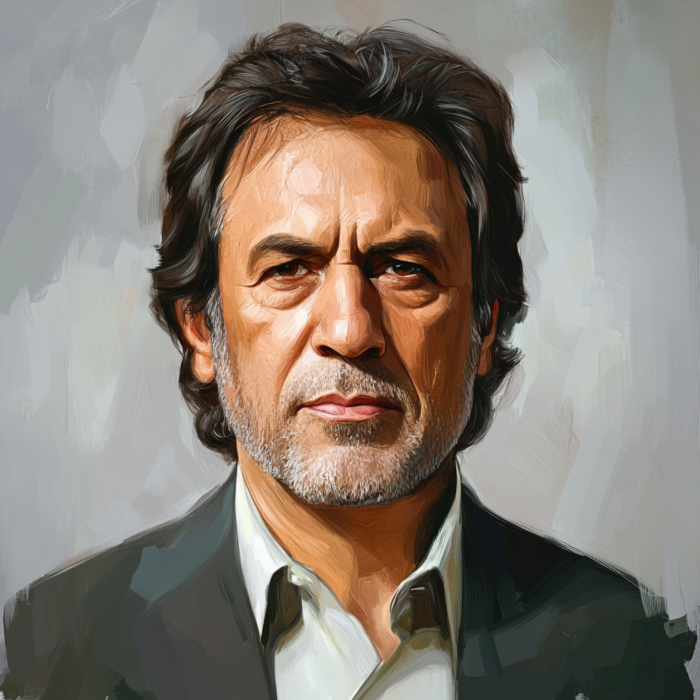


Imran Khan (born October 5, 1952) is a Pakistani politician, former cricketer, and philanthropist who served as the 22nd Prime Minister of Pakistan from 2018 until his ousting in 2022. Khan is the chairman of the political party Pakistan Tehreek-e-Insaf (PTI), which he founded in 1996. Before entering politics, Khan was a world-renowned cricketer who captained Pakistan to its first and only Cricket World Cup victory in 1992. His transition from sports icon to political leader was marked by his efforts to fight corruption, promote social justice, and create a welfare state in Pakistan. Khan’s political journey has been one of both triumph and controversy, and he remains one of the most influential and polarizing figures in Pakistan’s modern history.
Birth and Family Background: Imran Ahmed Khan Niazi was born on October 5, 1952, in Lahore, Punjab, Pakistan, to an affluent Pashtun family. His family belongs to the Niazi tribe, and his father, Ikramullah Khan Niazi, was a civil engineer. Khan’s mother, Shaukat Khanum, came from a family with a long history of involvement in politics. His maternal family has ties to Pakistan's influential Burki and Tareen families, including his cousins, the famous cricketers Majid Khan and Javed Burki.
Education: Khan received a privileged education, attending the prestigious Aitchison College in Lahore and then the Royal Grammar School in Worcester, England. He later studied at Keble College, University of Oxford, where he graduated with a degree in Philosophy, Politics, and Economics (PPE) in 1975. His time in England exposed him to both Western education and liberal values, which would influence his worldview in his later political career.
Early Cricket Career: Khan began his cricket career in Pakistan and made his debut for the national team in 1971 at the age of 18. He was an all-rounder, known for his fast bowling and aggressive batting, and quickly established himself as one of the most talented cricketers in Pakistan.
Captaincy and 1992 World Cup Victory: Imran Khan was appointed captain of the Pakistan national cricket team in 1982 and led the team through several successful international tours. His leadership reached its pinnacle when he captained Pakistan to victory in the 1992 Cricket World Cup, defeating England in the final. This triumph remains one of Pakistan’s greatest sporting achievements and cemented Khan’s status as a national hero. He retired from cricket following the World Cup win, having achieved legendary status in the sport.
Legacy as a Cricketer: Imran Khan is widely regarded as one of the greatest cricketers of all time, known for his leadership, all-round abilities, and competitive spirit. His ability to inspire his teammates and his calm demeanor under pressure made him a respected figure in international cricket.
Philanthropy and Shaukat Khanum Memorial Cancer Hospital: After retiring from cricket, Khan focused on philanthropy, founding the Shaukat Khanum Memorial Cancer Hospital & Research Centre in Lahore in memory of his mother, who died of cancer in 1985. The hospital, which opened in 1994, provides free cancer treatment to those in need and is one of the largest charitable institutions in Pakistan. Khan’s philanthropic work earned him widespread admiration and further enhanced his reputation as a man of integrity.
Founding of Pakistan Tehreek-e-Insaf (PTI): In 1996, Imran Khan formally entered politics by founding the Pakistan Tehreek-e-Insaf (PTI), with a platform centered on fighting corruption, promoting justice, and establishing a welfare state in Pakistan. Initially, PTI struggled to gain political traction, winning only a handful of votes in the 1997 general elections. However, Khan remained committed to his cause, gradually building PTI into a significant political force over the next two decades.
Early Struggles and Political Resilience: Imran Khan faced numerous challenges in the early years of his political career. PTI remained a marginal party during the 1990s and early 2000s, and Khan himself was often dismissed as a political outsider. His anti-corruption stance and criticism of Pakistan’s entrenched political dynasties – the Pakistan Muslim League (PML-N) led by the Sharif family and the Pakistan People's Party (PPP) led by the Bhutto family – earned him both supporters and detractors.
2013 General Elections: PTI’s fortunes changed in the lead-up to the 2013 general elections, when Imran Khan’s populist message began to resonate with younger voters and the middle class. Khan’s anti-corruption platform, combined with his calls for judicial reform, transparency, and accountability, helped PTI emerge as a serious contender in the elections. PTI became the second-largest party in terms of popular vote, winning 35 seats in the National Assembly. Although Khan did not become prime minister, the 2013 elections marked the beginning of his political ascension.
2014 Sit-in Protest: In 2014, Imran Khan led a months-long sit-in protest (known as the "Azadi March") in Islamabad, demanding the resignation of Prime Minister Nawaz Sharif over allegations of election rigging. While the protests failed to unseat Sharif, they further solidified Khan’s image as a reformist leader willing to challenge Pakistan’s political status quo.
2018 General Elections and Victory: Imran Khan and PTI achieved a major political victory in the 2018 general elections, winning the largest number of seats in the National Assembly. PTI formed a coalition government, and Khan was sworn in as the 22nd Prime Minister of Pakistan on August 18, 2018. His victory was seen as a turning point in Pakistani politics, as he broke the dominance of the traditional political dynasties and became a symbol of hope for many Pakistanis seeking change.
Austerity and Economic Challenges: As prime minister, Khan faced significant economic challenges. He inherited a struggling economy marked by high inflation, a large fiscal deficit, and mounting debt. His government implemented austerity measures, sought loans from international organizations such as the International Monetary Fund (IMF), and pursued economic reforms aimed at stabilizing the economy. However, his economic policies were criticized by some for exacerbating inflation and increasing the financial burden on ordinary citizens.
Anti-Corruption Agenda: One of Khan’s central promises as prime minister was to root out corruption from Pakistan’s political system. His government launched anti-corruption campaigns and investigations into past leaders, including Nawaz Sharif and members of the PPP. While his supporters praised these efforts, critics accused Khan of using anti-corruption rhetoric to target political opponents.
Foreign Policy: Imran Khan’s foreign policy was marked by a balancing act between Pakistan’s relationships with major powers. He sought to maintain close ties with China, particularly through the China-Pakistan Economic Corridor (CPEC), while also improving relations with the United States, which had been strained during the U.S. war in Afghanistan. Khan also emphasized Pakistan’s role in facilitating peace talks between the Taliban and the U.S., and he promoted the idea of a diplomatic solution to the conflict in Afghanistan.
Khan’s government also faced tensions with India, particularly after the 2019 Pulwama attack in Indian-administered Kashmir and the subsequent military escalation between the two nuclear-armed neighbors. Khan called for peace and diplomacy, but relations with India remained strained during his tenure.
Social Welfare Programs: Khan’s government launched several welfare initiatives aimed at reducing poverty and improving social services. His flagship program, the Ehsaas Program, focused on providing financial assistance to low-income families, promoting health care, and expanding social safety nets. He also emphasized housing projects and launched health insurance programs for underprivileged communities.
Pandemic Response: The COVID-19 pandemic posed significant challenges to Pakistan, and Khan’s government implemented lockdowns, public health campaigns, and economic relief programs to mitigate the impact of the virus. Pakistan’s response was mixed, with some successes in managing the spread of the virus but also criticism over the government’s handling of the economic fallout.
No-Confidence Vote and Ouster (2022): In early 2022, Imran Khan faced growing political opposition, as a coalition of opposition parties led by the PML-N and PPP accused his government of mismanaging the economy and failing to deliver on promises. A no-confidence motion was brought against him in March 2022, leading to a political crisis. After weeks of intense political maneuvering, Khan was ousted from power on April 10, 2022, when the National Assembly passed the no-confidence vote, making him the first Pakistani prime minister to be removed from office through such a vote.
Khan accused foreign powers, particularly the United States, of conspiring with opposition parties to remove him from office, though these claims were widely disputed. His ousting triggered protests from his supporters, and he vowed to challenge the decision and continue his political fight.
Return to the Streets: After his removal from office, Imran Khan remained a powerful political force in Pakistan. He led large rallies across the country, calling for early elections and criticizing the new government. His popularity remained strong among his base, particularly young voters and those frustrated with the traditional political elites.
Legal Challenges and Threats of Arrest: Khan also faced legal challenges, as opposition parties and the new government sought to investigate allegations of misconduct during his tenure. However, Khan maintained his stance as a political leader fighting against corruption and the entrenched political establishment, framing himself as a victim of political persecution.
Marriage and Family: Imran Khan’s personal life has been the subject of media scrutiny. He has been married three times. His first marriage was to Jemima Goldsmith, a British socialite, in 1995. The couple had two sons, but they divorced in 2004. Khan later married Reham Khan, a television journalist, in 2015, but the marriage ended in divorce after less than a year. In 2018, he married Bushra Bibi, a spiritual healer, which attracted significant attention in Pakistan.
Health and Lifestyle: Khan is known for his disciplined lifestyle and personal fitness, which he attributes to his cricketing career. He is also deeply influenced by his religious and spiritual beliefs, particularly Sufi Islam, which has guided much of his worldview.
Imran Khan’s journey from a cricketing legend to the prime minister of Pakistan is one of the most remarkable political stories in modern history. His leadership was defined by a blend of populist rhetoric, anti-corruption measures, and a vision of a "New Pakistan" grounded in social justice and welfare. Despite being ousted from power in 2022, Khan remains a significant and influential figure in Pakistani politics. His ability to galvanize supporters and maintain his political relevance ensures that his legacy will continue to shape the country’s future. Whether as a politician or a cricketing hero, Imran Khan’s impact on Pakistan is undeniable.

We use cookies
We use cookies and other tracking technologies to improve your browsing experience on our website, to show you personalized content and targeted ads, to analyze our website traffic, and to understand where our visitors are coming from. Privacy Policy.